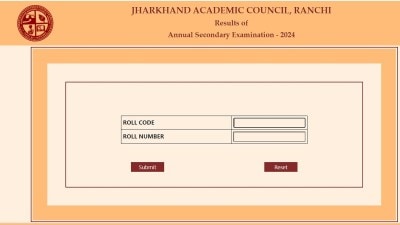- India
- International
Bharat Bandh against agri laws: Farmers block highways, railway tracks across states
BKU leader Rakesh Tikait said the Bharat bandh was a massive success. "We had the full support of farmers...We can't seal down everything as we have to facilitate the movement of people. We are ready for discussions with the government but no talks are happening,” he said.
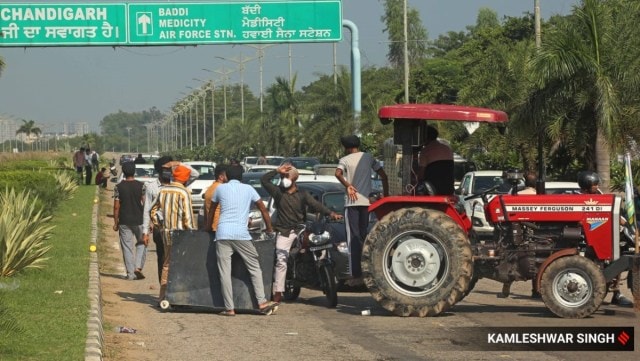 Farmers block a road at the Mullanpur-Chandigarh barrier during the Bharat bandh on Monday (Express photo by Kamleshwar Singh)
Farmers block a road at the Mullanpur-Chandigarh barrier during the Bharat bandh on Monday (Express photo by Kamleshwar Singh)Farmers blocked major highways and squatted on railway tracks in many states, including Punjab, Haryana and Delhi, during the Bharat bandh called by farmers’ bodies on Monday to protest against the new agri laws. The nationwide strike began at 6 am and ended at 4 pm.
Commercial establishments remained shut and the movement of public transport was affected in many places as major highways and railway tracks were blocked by the protesters.
The effect of the bandh was felt the most around Delhi, Punjab, Haryana and western Uttar Pradesh, the centre of the farm protests, and also in large pockets of Kerala, Bihar, Jharkhand, West Bengal and Odisha.
The movement of 25 trains was affected due to the bandh, officials told news agency PTI, adding, “More than 20 locations were blocked in Delhi, Ambala, and Firozepur divisions. Officials said the Delhi-Amritsar Shan-e-Punjab, New Delhi-Moga Express, Old Delhi-Pathankot Express, Vande Bharat Express from New Delhi to Katra, and Amritsar Shatabdi were some of the trains affected.
In the North-Western Railway zone, rail traffic on the Rewari-Bhiwani, Bhiwani-Rohtak, Bhiwani-Hisar and Hanumangarh-Sadulpur-Sriganganagar-Fatuhi sections was hit due to the farmers’ agitation.

BKU leader Rakesh Tikait said the bandh was a massive success. “Our Bharat bandh was successful. We had the full support of farmers…We can’t seal down everything as we have to facilitate the movement of people. We are ready for discussions with the government but no talks are happening,” he was quoted as saying by PTI.
The Samyukta Kisan Morcha said that there was an unprecedented response to bandh call given by farmers.
Meanwhile, as farmers across the country held protests, the Congress on Monday urged Prime Minister Narendra Modi to talk to agitating farmers and listen to their legitimate grievances.
The Congress also alleged that instead of redressing the grievances of farmers, the government is trying to paint them as enemies of the country and that is why the farmers are protesting on the roads.
Expressing support for protesting farmers, Congress leader Rahul Gandhi said the farmers’ non-violent ‘satyagraha’ is still resolute.
Posting rhyming lines in Hindi on Twitter, Gandhi said, “Kisano ka ahimsak satyagraha aaj bhi akhand hai, lekin shoshankar sarkar ko ye nahi pasand hai, isliye aaj Bharat Bandh hai (Farmers’ non-violent satyagraha is resolute even today, but the exploitative government does not like this and that’s why it is Bharat Bandh today).”
“We have to stand unitedly with the farmers, otherwise the future of our nation is dark,” Congress spokesperson Pawan Khera told reporters.
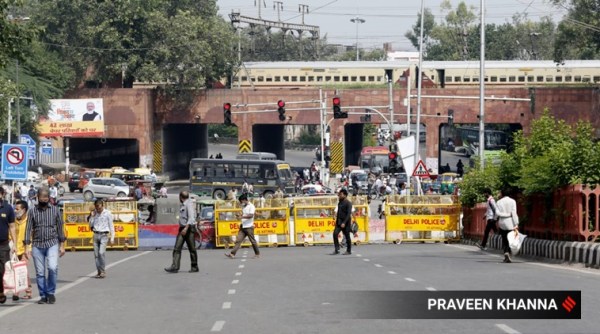 A road closed in Delhi during the protests (Express photo by Praveen Khanna)
A road closed in Delhi during the protests (Express photo by Praveen Khanna)
Delhi
In Delhi, a section of the trade unions and civil society groups held a protest at Jantar Mantar. The Samyukta Kisan Morcha (SKM), an umbrella body of over 40 farm unions spearheading the agitation against the tree contentious laws, had appealed to people on Thursday to join the bandh.
Holding banners that read “Long Live Farmers Unity”, demanding a repeal of the three farm laws and equal opportunities for all, the protesters held a march at Jantar Mantar. Organisations including the All India Central Council of Trade Unions (AICCTU), the Centre of Indian Trade Unions (CITU), the All India Kisan Sabha, the Janwadi Mahila Samiti and the United Trade Union Congress (UTUC) participated in the protest and also raised their voices against issues apart from those related to farmers.
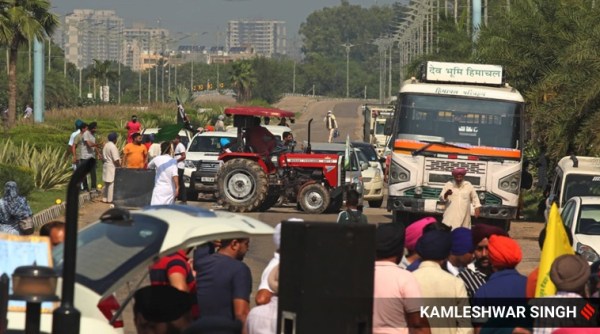 Major roads were blocked by the protesters at many places (Express photo by Kamleshwar Singh)
Major roads were blocked by the protesters at many places (Express photo by Kamleshwar Singh)
Parts of the national capital witnessed traffic snarls in morning hours as police closed some key roads to prevent any untoward incident during the bandh. Commuters faced difficulty while crossing the city borders, especially the Delhi-Gurgaon border. The traffic on DND was also affected. The Ghazipur border is closed for vehicular movement and the whole traffic is being diverted to DND and Apsara border for Noida and Ghaziabad respectively.
There was chaos on one carriageway of the national highway coming from Ghazipur border to Sarai Kale Khan near Akshardham Mandir.
However, markets remained open and business activities were largely unaffected in the national capital, despite the traffic snarls due to road blockades by protesters and security checks by police.
The auto and taxi unions as well as several traders’ bodies extended only “in-principle support” to the Bharat Bandh and decided not to join the strike, saying their livelihood has already been hit hard due to the pandemic and lockdown.
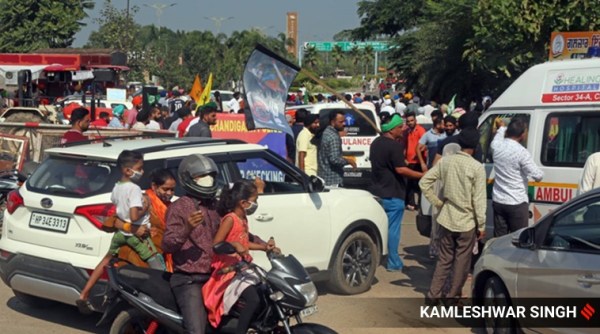 There was traffic congestion on many thoroughfares due to the protests ((Express photo by Kamleshwar Singh)
There was traffic congestion on many thoroughfares due to the protests ((Express photo by Kamleshwar Singh)
Punjab and Haryana
Across Punjab and Haryana, protests were organised at more than 350 places. Markets were also closed in most parts of Punjab except for Mohali and Chandigarh, were sector markets were open. The Ferozepur railway division had to cancel 14 passenger trains. Four trains were short-terminated while eight mail express trains were cancelled. There were agitations carried on highways and link roads as well.
Students at Punjabi University Patiala and Guru Nanak Dev University Amritsar too staged protests in support of farmers.
Many workers were not able to reach their workplaces because of the dharnas. Pankaj Sharma, vice-president of the Chamber of Industrial and Commercial Undertakings, said, “I don’t know why the government is not sorting out the farmers’ issue. Many were not able to reach their workplaces due to the protest.”
The 32 unions of SKM’s, BKU Ugrahan and Kisan Mazdoor Sangrash Committee organised protests at many places.
SKM member Dr Darshan Pal said, “Protests have been going on the Delhi borders for the past 10 months but to no avail. Monday’s bandh was another effort to try to wake up the government from its slumber. We will not give up until the three farm laws are repealed.”
On the Tikri border, protests were held at the Bahadurgarh railway station in Haryana as farmers sat down on tracks at Jagraon, Barnala, Mansa and Sangrur. The Congress, AAP, and the SAD-BSP extended their support to the bandh.
The bandh elicited mixed responses in Maharashtra on Monday, with symbolic protests being held at many places.
The ruling Congress and NCP supported the bandh but the Shiv Sena remained non-committal on the issue.
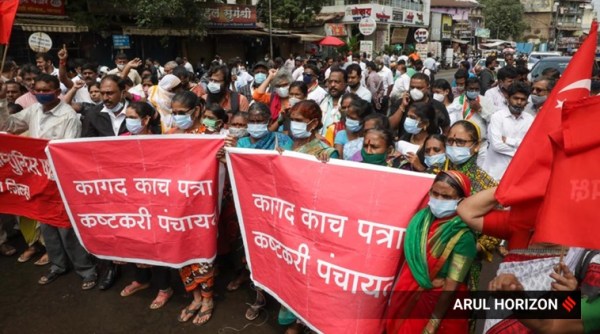 Protests held during the bandh in Pune on Monday (Express photo by Arul Horizon)
Protests held during the bandh in Pune on Monday (Express photo by Arul Horizon)
The ruling NCP held symbolic protests to express its solidarity with the farmers. State NCP chief and water resources minister Jayant Patil participated in the protests organised by his party unit in Aurangabad. At a public meeting, Patil led the workers wearing black badges to hold a symbolic protest.
Patil said, “The NCP supports the bandh to highlight the plight of farmers. As a mark of protest, we not only held demonstrations but also wore black badges.”
The effect of the bandh was visible in many districts of Rajasthan, including agriculture-dominated Ganganagar and Hanumangarh, where the major mandis and markets remained closed. Farmers took out rallies on the major roads and held meetings.
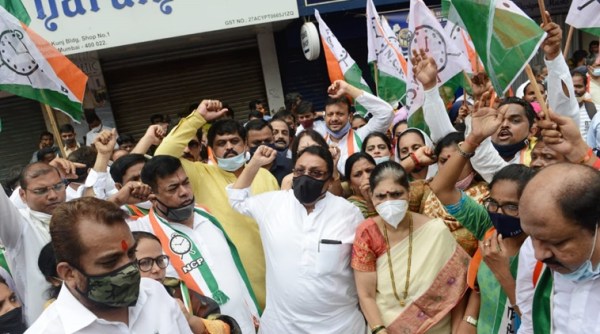 Nawab Malik at a protest in Mumbai on Monday (Express photo)
Nawab Malik at a protest in Mumbai on Monday (Express photo)
The shutdown affected many districts of the state, including Ganganagar, Hanumangarh, Bikaner, Sikar and Nagaur. Mandis and markets were partially closed in the cities and towns of these districts.
The agitating farmers blocked the major roads and held meetings. The bandh also affected train services in the border districts. In Jaipur, farmers led by the Bharatiya Kisan Union (BKU) took out a rally on tractor-trolleys.
Bihar
Highways, roads and railway tracks were blocked in several places across Bihar on Monday as the bandh evoked a mixed response in the state. RJD and Congress workers blocked roads in Patna, Bhojpur, Lakhisarai, Jahanabad, East Champaran, Begusarai, Madhepura and Nalanda districts, affecting the movement of the traffic.
In Patna, RJD workers blocked the road near Buddha Smriti Park, burning tyres in protest against the three farm laws. However, they were swiftly removed, a police officer said. RJD and CPI members also blocked railway lines in Patna, Ara, Jahanabad and Madhepura.
“Adequate security personnel have been deployed at railway stations and other sensitive places in the state to check any untoward incident,” an official told PTI.
Markets were open, while government and private offices registered usual attendance. Public transport also remained largely unaffected. However, most of the private schools in the state remained shut due to the 10-hour bandh called by the Samyukta Kisan Morcha.
Jharkhand
In Jharkhand, vehicular movement was disrupted in several parts as bandh supporters blocked roads and highways. Shops were shut in state capital Ranchi, while government offices and banks functioned as usual.
In Ramgarh district, protesters blocked the Ranch-Patna highway and Ramgarh-Bokaro highway for some time, disrupting traffic, SP Prabhat Kumar told PTI. Several roads in the district were blocked by JMM, CPI, RJD and Congress workers, leading to congestion on the highways.
The bandh, however, drew lukewarm response in Madhya Pradesh and Goa. Eyewitnesses said road traffic was normal in the state capital Bhopal and commercial hub Indore.
However, talking to PTI, Rashtriya Kisan Mazdoor Mahasangh national president Shivkumar Kakkaji claimed, “The bandh called by farmers against the three laws and for demanding guaranteed MSP for crops has been successful.”
He further claimed that the outfit had given relaxation from the shutdown to Bhopal as most of its residents are (private and government sector) employees and not farmers, but the protest was successful in the farming community-dominated small towns of Nimar region, Shahdol, Umaria, Raisen and Silwani.
In Goa, all services, including public transport, banks, trains and commercial establishments, ran normally. “There have been no protests. Life remained normal,” a police officer was quoted as saying by PTI.
(With inputs from ENS and agencies)
Apr 19: Latest News
- 01
- 02
- 03
- 04
- 05


